Question and Answer forum for K12 Students


Money Can’t Buy Happiness Essay for Students and Children in English
Money Can’t Buy Happiness Essay: The proverb “Money Can’t Buy Happiness” states that money can buy all the materialistic things like cars, houses, and also you can live a luxurious life too but having all the materialistic things surely will not give happiness. Money can be used to buy anything in the world but there is no shop where you can walk and buy happiness and so they say money can’t buy happiness.
When it comes to the question of whether money can buy happiness or not the answer here is that money is just a tool to buy things that give us luxury which in turn will give us happiness. But it doesn’t necessarily increase our happiness. Buying more and more luxurious things won’t really bring you more joy. More money isn’t going to improve your mindset, nor will it bring peace to mind. In other words, you can say that more money can’t buy happiness. There are many aspects which money can’t give.
You can read more Essay Writing about articles, events, people, sports, technology many more.
Suppose you think a new 24” LED TV will bring you happiness but after having the same 24” LED you see a better option and it makes you feel sad. You want to have better than this. It is not actually the tv that gives you happiness, it is the human nature of having more. A human being is one who is never satisfied. Happiness is actually the state of mind which cannot be achieved by materialistic things. There are many reasons which prove that money can’t buy happiness.
Buying stuff won’t make us happy, because we tend to compare it with others. Comparisons are ridiculous and quite often harmful to us.
What is Happiness?
Is it a big car, a luxurious house, or a big-screen LED TV? Buying any new stuff feels great at first. But gradually months and years later, the excitement decreases. The bright, shiny, newness will eventually go down and you’ll want a new one or more.
Happiness is a feeling. Feeling that money can’t buy. If someone asks are you happy, what will you answer?.
Happiness means satisfaction. Be satisfied with what you have in your life. Not to crave on the things that you don’t have.

Reasons Why Money Can’t Buy Happiness
There are some very good reasons why having more money doesn’t necessarily make a person happier. It can actually turn the opposite. Many wealthy people, for example, are actually under stress.
Here we mention few reasons why money can’t buy happiness
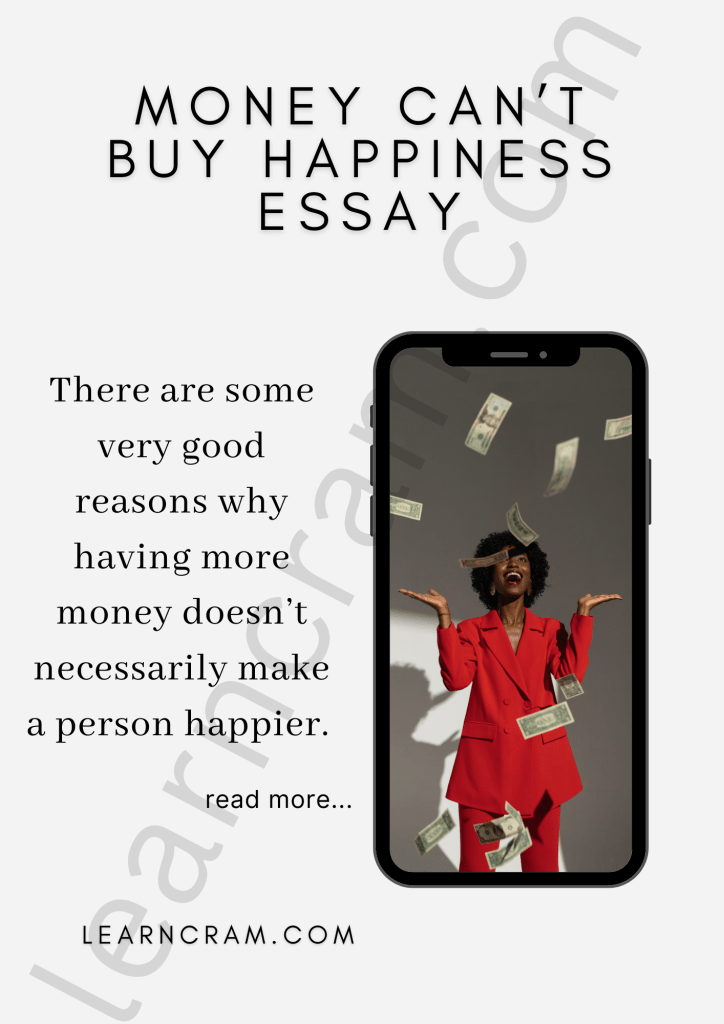
More Stuff More Work
Many think that if you get more luxurious stuff our life would be happier but that isn’t true. The more the stuff, the more work it takes to take care of it. Day by day everything has become larger. Today people want larger houses to live in but keeping it clean and maintained is again a challenge. It takes more time and effort to keep your mansions neat and tidy.
More Stuff Less Free Time
As you own more stuff, you will get less free time because you’ll be spending time in the maintenance of the things you bought. Time is very important for everyone, but much of our free time is spent doing house chores and taking care of our stuff. You can use the money to hire maids but that is not possible in every situation.
More Stuff More Expenses
The more stuff you own, the more money you will have to spend to maintain it.
For example, bigger houses need more repairs than smaller ones. Unfortunately, repairs are a necessary part and can be expensive.
The more stuff you own, the more work and money is spent to maintain it. Having less stuff can free up some of your time to do things you enjoy. So money cannot always bring you happiness.
Materialistic things give Temporary Satisfaction
Money can buy temporary happiness. Everyone experiences themselves on cloud nine when they’ve bought something they’ve been desiring. These feelings of happiness are usually temporary. This happiness soon fades away and that new thing is no longer interesting.
Scientists have proved that we get more happiness from our experiences but not from materialistic things. And also they don’t cost much.
Time spent with your loved ones will give you more happiness than buying a costly item that you were eyeing for a long time.
Money Can’t Buy Family, Friends and Love
Family, friends and your loved ones are the people who will make you special. They are the people whose surroundings will make you happy. And definitely, money cannot buy these relationships.
When people are dying and taking their last breath they don’t want to see the things they own or the achievements of their life. All they want to see are their loved ones.
It’s their relationships that really matter but not stuff.
True love doesn’t care whether your loved one is rich or poor. That person will value you for who you are and not money.

Money Can’t Give You Peace of Mind
A person can live without a big house, he can survive without driving a car but cannot live with a stressful mind. True happiness has nothing to do with the bank balance. More money also sometimes steals away the peace of mind because of insecurity.
Changing our outlook for money is the first step in achieving true happiness, the kind of happiness that comes from being satisfied with what you have.
In conclusion, once you have your basic needs like food, water, shelter, clothing and the feeling of safety, then money can’t buy happiness.
It’s up to you to build meaningful relationships, enjoy the little things in life, and start spending your money on experiences and other people rather than materialistic things.
Happiness Economics: Can Money Buy Happiness?

It only costs a small amount, a slight risk, with the possibility of a substantial reward.
But will it make you happy? Will it give you long-lasting happiness?
Undoubtedly, there will be a temporary peak in happiness, but will all your troubles finally fade away?
That is what we will investigate today. We explore the economics of happiness and whether money can buy happiness. In this post, we will start by broadly exploring the topic and then look at theories and substantive research findings. We’ll even have a look at previous lottery winners.
For interested readers, we will list interesting books and podcasts for further enjoyment and share a few of our own happiness resources.
Ka-ching: Let’s get rolling!
Before you continue, we thought you might like to download our three Happiness & Subjective Wellbeing Exercises for free . These detailed, science-based exercises will help you or your clients identify sources of authentic happiness and strategies to boost wellbeing.
This Article Contains
What is happiness economics, theory of the economics of happiness, can money buy happiness 5 research findings, 6 fascinating books and podcasts on the topic, resources from positivepsychology.com, a take-home message.
Happiness economics is a field of economics that recognizes happiness and wellbeing as important outcome measures, alongside measures typically used, such as employment, education, and health care.
Economics emphasizes how specific economic/financial characteristics affect our wellbeing (Easterlin, 2004).
For example, does employment result in better health and longer lifespan, among other metrics? Do people in wealthier countries have access to better education and longer life spans?
In the last few decades, there has been a shift in economics, where researchers have recognized the importance of the subjective rating of happiness as a valuable and desirable outcome that is significantly correlated with other important outcomes, such as health (Steptoe, 2019) and productivity (DiMaria et al., 2020).
Broadly, happiness is a psychological state of being, typically researched and defined using psychological methods. We often measure it using self-report measures rather than objective measures that are less vulnerable to misinterpretation and error.
Including happiness in economics has opened up an entirely new avenue of research to explore the relationship between happiness and money.
Andrew Clark (2018) illustrates the variability in the term happiness economics with the following examples:
- Happiness can be a predictor variable, influencing our decisions and behaviors.
- Happiness might be the desired outcome, so understanding how and why some people are happier than others is essential.
However, the connection between our behavior and happiness must be better understood. Even though “being happy” is a desired outcome, people still make decisions that prevent them from becoming happier. For example, why do we choose to work more if our work does not make us happier? Why are we unhappy even if our basic needs are met?
An example of how happiness can influence decision-making
Sometimes, we might choose not to maximize a monetary or financial gain but place importance on other, more subjective outcomes.
To illustrate: If faced with two jobs — one that pays well but will bring no joy and another that pays less but will bring much joy — some people would prefer to maximize their happiness over financial gain.
If this decision were evaluated using a utility framework where the only valued outcomes were practical, then the decision would seem irrational. However, this scenario suggests that psychological outcomes, such as the experience of happiness, are as crucial as other socio-economic outcomes.
Economists recognize that subjective wellbeing , or happiness, is an essential characteristic and sometimes a desirable outcome that can motivate our decision-making.
In the last few decades, economics has shifted to include happiness as a measurable and vital part of general wellbeing (Graham, 2005).
The consequence is that typical economic questions now also look at the impact of employment, finances, and other economic metrics on the subjective rating and experience of happiness at individual and country levels.

Happiness is such a vital outcome in society and economic activity that it must be involved in policy making. The subjective measure of happiness is as important as other typical measures used in economics.
Many factors can contribute to happiness. In this post, we consider the role of money. The relationship between happiness, or subjective wellbeing, and money is assumed to be positive: More money means greater happiness.
However, the relationship between money and happiness is paradoxical: More money does not guarantee happiness (for an excellent review, see Graham, 2005).
Specifically, low levels of income are correlated with unhappiness. However, as our individual wealth increases and our basic needs are met, our needs change and differ in their importance.
Initially, our happiness is affected by absolute levels of income, but at a certain threshold, we place importance on relative levels of income. Knowing how we rank and compare to other people, in terms of wealth and material possession, influences our happiness.
The relationship between wealth and happiness continues to increase, but only to a certain point; at this stage, more wealth does not guarantee more happiness (Easterlin, 1974; Diener et al., 1993).
This may be at odds with our everyday lived experience. Most of us choose to work longer hours or multiple jobs so that we make more money. However, what is the point of doing this if money does not increase our happiness? Why do we seem to think that more money will make us happier?
History of the economics of happiness
The relationship between economics and happiness originated in the early 1970s. Brickman and Campbell (1971, as cited in Brickman et al., 1978) first argued that the typical outcomes of a successful life, such as wealth or income, had no impact on individual wellbeing.
Easterlin (1974) expanded these results and showed that although wealthier people tend to be happier than poor people in the same country, the average happiness levels within a country remained unchanged even as the country’s overall wealth increased.
The inconsistent relationship between happiness and income and its sensitivity to critical income thresholds make this topic so interesting.
There is some evidence that wealthier countries are happier than others, but only when comparing the wealthy with the poor (Easterlin, 1974; Graham, 2005).
As countries become wealthier, citizens report higher happiness, but this relationship is strongest when the starting point is poverty. Above a certain income threshold, happiness no longer increases (Diener et al., 1993).
Interestingly, people tend to agree on the amount of money needed to make them happy; but beyond a certain value, there is little increase in happiness (Haesevoets et al., 2022).
Measurement challenges
Measuring happiness accurately and reliably is challenging. Researchers disagree on what happiness means.
It is not the norm in economics to measure happiness by directly asking a participant how happy they are; instead, happiness is inferred through:
- Subjective wellbeing (Clark, 2018; Easterlin, 2004)
- A combination of happiness and life satisfaction (Bruni, 2007)
Furthermore, happiness can refer to an acute psychological state, such as feeling happy after a nice meal, or a lasting state similar to contentment (Nettle, 2005).
Researchers might use different definitions of happiness and ways to measure it, thus leading to contradictory results. For example, happiness might be used synonymously with subjective wellbeing and can refer to several things, including life satisfaction and financial satisfaction (Diener & Oishi, 2000).
It seems contradictory that wealthier nations are not happier overall than poorer nations and that increasing the wealth of poorer nations does not guarantee that their happiness will increase too. What could then be done to increase happiness?

Download 3 Free Happiness Exercises (PDF)
These detailed, science-based exercises will equip you or your clients with tools to discover authentic happiness and cultivate subjective well-being.
Download 3 Free Happiness Tools Pack (PDF)
By filling out your name and email address below.
- Email Address *
- Your Expertise * Your expertise Therapy Coaching Education Counseling Business Healthcare Other
- Comments This field is for validation purposes and should be left unchanged.
What is the relationship between income/wealth and happiness? To answer that question, we looked at studies to see where and how money improves happiness, but we’ll also consider the limitations to the positive effect of income.
Money buys access; jobs boost happiness
Overwhelming evidence shows that wealth is correlated with measures of wellbeing.
Wealthier people have access to better healthcare, education, and employment, which in turn results in higher life satisfaction (Helliwell et al., 2012). A certain amount of wealth is needed to meet basic needs, and satisfying these needs improves happiness (Veenhoven & Ehrhardt, 1995).
Increasing happiness through improved quality of life is highest for poor households, but this is explained by the starting point. Access to essential services improves the quality of life, and in turn, this improves measures of wellbeing.
Most people gain wealth through employment; however, it is not just wealth that improves happiness; instead, employment itself has an important association with happiness. Happiness and employment are also significantly correlated with each other (Helliwell et al., 2021).
Lockdown on happiness
The World Happiness Report (Helliwell et al., 2021) reports that unemployment increased during the COVID-19 pandemic, and this was accompanied by a marked decline in happiness and optimism.
The pandemic also changed how we evaluated certain aspects of our lives; for example, the relationship between income and happiness declined. After all, what is the use of money if you can’t spend it? In contrast, the association between happiness and having a partner increased (Helliwell et al., 2021).
Wealthier states smile more, but is it real?
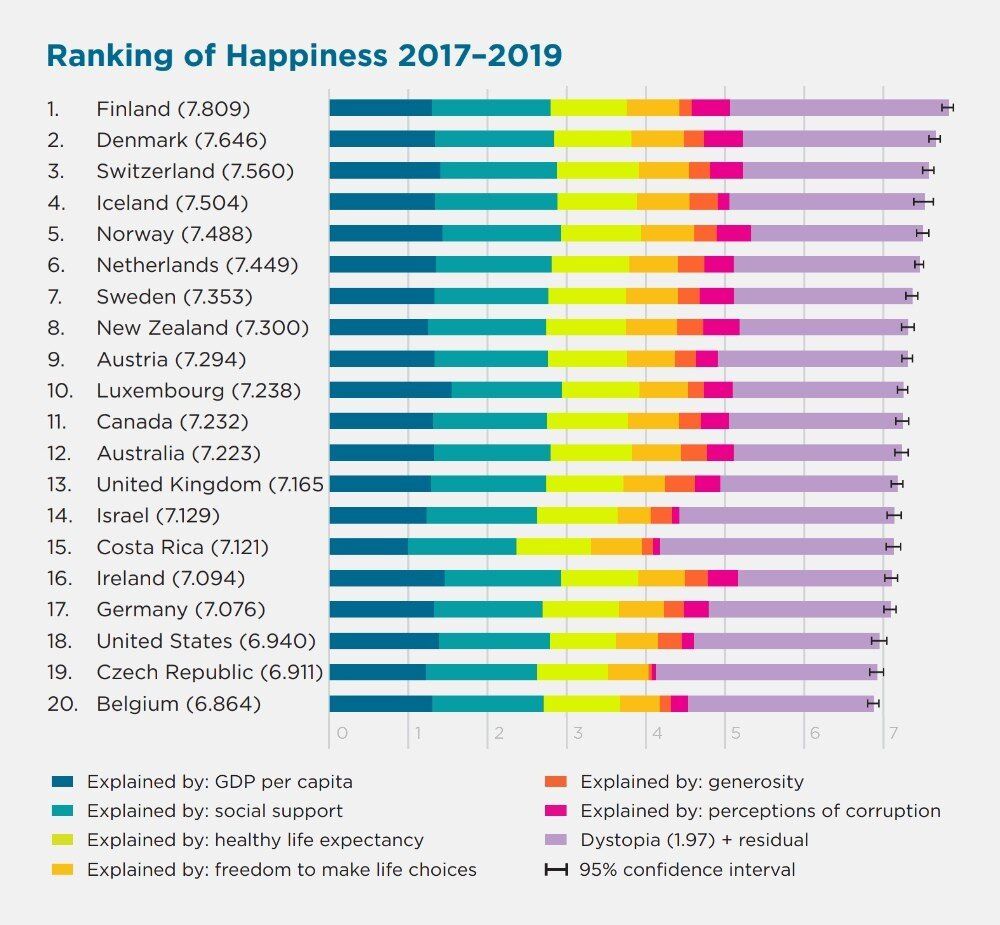
If we took a snapshot of happiness and a country’s wealth, we would find that richer countries tend to have happier populations than poorer countries.
For example, based on the 2021 World Happiness Report, the top five happiest countries — which are also wealthy countries — are Finland, Iceland, Denmark, Switzerland, and the Netherlands (Helliwell et al., 2021).
In contrast, the unhappiest countries are those that tend to be emerging markets or have a lower gross domestic product (GDP), e.g., Zimbabwe, Tanzania, and India (Graham, 2005; Helliwell et al., 2021).
At face value, this makes sense: Poorer countries most likely have other factors associated with them, e.g., higher unemployment, more crime, and less political stability. So, based on this cross-sectional data, a country’s wealth and happiness levels appear to be correlated. However, over a more extended period, the relationship between happiness and GDP is nil (Easterlin, 2004).
That is, the subjective wellbeing of a population does not increase as a country becomes richer. Even though the wealth of various countries worldwide has increased over time, the overall happiness levels have not increased similarly or have remained static (Kahneman et al., 2006). This is known as a happiness–income paradox.
Easterlin (2004) posits four explanations for this finding:
- Societal and individual gains associated with increased wealth are concentrated among the extremely wealthy.
- Our degree of happiness is informed by how we compare to other people, and this relative comparison does not change as country-wide wealth increases.
- Happiness is not limited to only wealth and financial status, but is affected by other societal and political factors, such as crime, education, and trust in the government.
- Long-term satisfaction and contentment differ from short-term, acute happiness.
Kahneman et al. (2006) provide an alternative explanation centered on the method typically used by researchers. Specifically, they argue that the order of the questions asked to measure happiness and how these questions are worded have a focusing effect. Through the question, the participant’s attention to their happiness is sharpened — like a lens in a camera — and their happiness needs to be over- or underestimated.
Kahneman et al. (2006) also point out that job advancements like a raise or a promotion are often accompanied by an increase in salary and work hours. Consequently, high-paying jobs often result in less leisure time available to spend with family or on hobbies and can cause more unhappiness.
Not all that glitters is gold
Extensive research explored whether a sudden financial windfall was associated with a spike in happiness (e.g., Sherman et al., 2020). The findings were mixed. Sometimes, having more money is associated with increased life satisfaction and improved physical and mental health.
This boost in happiness, however, is not guaranteed, nor is it long. Sometimes, individuals even wish it had never happened (Brickman et al., 1978; Sherman et al., 2020).
Consider lottery winners. These people win sizable sums of money — typically more extensive than a salary increase — large enough to impact their lives significantly. Despite this, research has consistently shown that although lottery winners report higher immediate, short-term happiness, they do not experience higher long-term happiness (Sherman et al., 2020).
Here are some reasons for this:
- Previous everyday activities and experiences become less enjoyable when compared to a unique, unusual experience like winning the lottery.
- People habituate to their new lifestyle.
- A sudden increase in wealth can disrupt social relationships among friends and family members.
- Work and hobbies typically give us small nuggets of joy over a more extended period (Csikszentmihalyi et al., 2005). These activities can lose their meaning over a longer period, resulting in more unhappiness (Sherman et al., 2020; Brickman et al., 1978).
Sherman et al. (2020) further argue that lottery winners who decide to quit their job after winning, but do not fill this newly available time with some type of meaningful hobby or interest, are also more likely to become unhappy.
Passive activities do not provide the same happiness as work or hobbies. Instead, if lottery winners continue to take part in activities that give them meaning and require active engagement, then they can avoid further unhappiness.
Happiness: Is it temperature or climate?
Like most psychological research, part of the challenge is clearly defining the topic of investigation — a task made more daunting when the topic falls within two very different fields.
Nettle (2005) describes happiness as a three-tiered concept, ranging from short-lived but intense on one end of the spectrum to more abstract and deep on the other.
The first tier refers to transitory feelings of joy, like when one opens up a birthday present.
The second tier describes judgments about feelings, such as feeling satisfied with your job. The third tier is more complex and refers to life satisfaction.
Across research, different definitions are used: Participants are asked about feelings of (immediate) joy, overall life satisfaction, moments of happiness or satisfaction, and mental wellbeing . The concepts are similar but not identical, thus influencing the results.
Most books on happiness economics are textbooks. Although no doubt very interesting, they’re not the easy-reading books we prefer to recommend.
Instead, below you will find a range of books written by economists that explore happiness. These should provide a good springboard on the overall topic of happiness and what influences it, in case any of our readers want to pick up a more in-depth textbook afterward.
If you have a happiness book you would recommend, please let us know in the comments section.
1. Happiness: Lessons from a New Science – Richard Layard
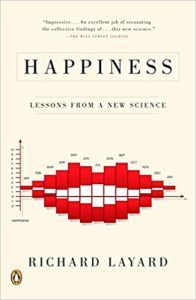
Richard Layard, a lead economist based in London, explores in his book if and how money can affect happiness.
Layard does an excellent job of introducing topics from various fields and framing them appropriately for the reader.
The book is aimed at readers from varying academic and professional backgrounds, so no experience is needed to enjoy it.
Find the book on Amazon .
2. Happiness by Design: Change What You Do, Not How You Think – Paul Dolan
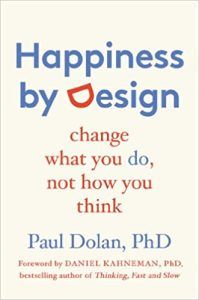
This book has a more practical spin. The author explains how we can use existing research and theories to make small changes to increase our happiness.
Paul Dolan’s primary thesis is that practical things will have a bigger effect than abstract methods, and we should change our behavior rather than our thinking.
The book is a quick read (airport-perfect!), and Daniel Kahneman penned the foreword.
3. The Psychology of Money: Timeless Lessons on Wealth, Greed and Happiness – Morgan Housel
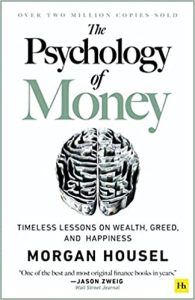
This book is not necessarily about happiness economics, but it is close enough to the overall theme that it is worth mentioning.
Since most people are concerned with making more money, this book helps teach the reader why we make the decisions we do and how we make better decisions about our money.
This book is a worthwhile addition to any bookcase if you are interested in the relationship between finances and psychology in general.
4. Happiness: The Science Behind Your Smile – Daniel Nettle

If you are interested in happiness overall, then we recommend Happiness: The Science Behind Your Smile by Daniel Nettle, a professor of behavioral science at Newcastle University.
In this book, he takes a scientific approach to explaining happiness, starting with an in-depth exploration of the definition of happiness and some of its challenges.
The research that he presents comes from various fields, including social sciences, medicine, neurobiology, and economics.
Because of its small size, this book is perfect for a weekend away or to read on a plane.
5 & 6. Prefer to listen rather than read?
One of our favorite podcasts is Intelligence2, where leading experts in a particular field gather to debate a particular topic.

This show’s host, Dr. Laurie Santos, argues that we can increase our happiness by not hoarding our money for ourselves but by giving it to others instead. If you are interested in this episode , or any of the other episodes in the Happiness Lab podcast series, then head on over to their page.
There are several resources available at PositivePsychology.com for our readers to use in their professional and personal development.
In this section, you’ll find a few that should supplement any work on happiness and economics. Since the undercurrent of the topic is whether happiness can be improved through wealth, a few resources look at happiness overall.
Valued Living Masterclass
Although knowledge is power, knowing that money does not guarantee happiness does not mean that clients will suddenly feel fulfilled and satisfied with their lives.
For this reason, we recommend the Valued Living Masterclass , for professionals to help their clients find meaning in their lives. Rather than keeping up with the Joneses or chasing a high-paying job, professionals can help their clients connect with their inner meaning (i.e., their why ) as a way to find meaning and gain happiness.
Three free exercises
If you want to try it out before committing, look at the Meaning & Valued Living exercise pack , which includes three exercises for free.
Recommended reading
Read our post on Success Versus Happiness for further information on balancing happiness with success, in any domain . This topic is poignant for readers who conflate happiness and success, and will guide readers to better understand their relationship and how the two terms influence each other.
For readers who wonder about altruism , you would find it interesting that rather than hoarding, you can increase your happiness through volunteering and donating. In this post, the author, Dr. Jeremy Sutton, does a fabulous job of approaching altruism from various fields and provides excellent resources for further reading and real-life application.
Our last recommendation is for readers who want to know more about measuring subjective wellbeing and happiness . The post lists various tests and apps that can measure happiness and the overall history of how happiness was measured and defined. This is a good starting point for researchers or clinicians who want to explore happiness economics professionally.
17 Happines Exercises
If you’re looking for more science-based ways to help others develop strategies to boost their wellbeing, this collection contains 17 validated happiness and wellbeing exercises . Use them to help others pursue authentic happiness and work toward a life filled with purpose and meaning

17 Exercises To Increase Happiness and Wellbeing
Add these 17 Happiness & Subjective Well-Being Exercises [PDF] to your toolkit and help others experience greater purpose, meaning, and positive emotions.
Created by Experts. 100% Science-based.
As you’ve seen in our article, the evidence overwhelmingly clarifies that money does not guarantee more happiness … well, long-term happiness.
Our happiness is relative since we compare ourselves to other people, and over time, as we become accustomed to our wealth, we lose all the happiness gains we made.
Money can ease financial and social difficulties; consequently, it can drastically improve people’s living conditions, life expectancy, and education.
Improvements in these outcomes have a knock-on effect on the overall experience of one’s life and the opportunities for one’s family and children. Nevertheless, better opportunities do not guarantee happiness.
Our intention with this post was to illustrate some complexities surrounding the relationship between money and happiness.
Knowing that money does not guarantee happiness, we recommend less expensive methods to improve one’s happiness:
- Spend time with friends.
- Cultivate hobbies and interests.
- Stay active and eat healthy.
- Try to live a meaningful life.
- Give some love (go smooch your partner or tickle your dog’s belly).
Diamonds might be a girl’s best friend, but money is a fair weather one, at best.
We hope you enjoyed reading this article. Don’t forget to download our three Happiness Exercises for free .
- Brickman, P., Coates, D., & Janoff-Bulman, R. (1978). Lottery winners and accident victims: Is happiness relative? Journal of Personality and Social Psychology , 36 (8), 917.
- Bruni, L. (2007). Handbook on the economics of happiness . Edward Elgar.
- Clark, A. E. (2018). Four decades of the economics of happiness: Where next? Review of Income and Wealth , 64 (2), 245–269.
- Csikszentmihalyi, M., Abuhamdeh, S., & Nakamura, J. (2005). Flow. In A. J. Elliot & C. S. Dweck (Eds.), Handbook of competence and motivation (pp. 598–608). Guilford Publications.
- Diener, E., Sandvik, E., Seidlitz, L., & Diener, M. (1993). The relationship between income and subjective well-being: Relative or absolute? Social Indicators Research , 28 , 195–223.
- Diener, E., & Oishi, S. (2000). Money and happiness: Income and subjective well-being across nations. Culture and Subjective Well-Being , 185 , 218.
- DiMaria, C. H., Peroni, C., & Sarracino, F. (2020). Happiness matters: Productivity gains from subjective well-being. Journal of Happiness Studies , 21 (1), 139–160.
- Easterlin, R. A. (1974). Does economic growth improve the human lot? Some empirical evidence. In P. A. David & M. W. Reder (Eds.), Nations and households in economic growth: Essays in honor of Moses Abramovitz (pp. 89–125). Academic Press.
- Easterlin, R. A. (2004). The economics of happiness. Daedalus , 133 (2), 26–33.
- Graham, C. (2005). The economics of happiness. World Economics , 6 (3), 41–55.
- Haesevoets, T., Dierckx, K., & Van Hiel, A. (2022). Do people believe that you can have too much money? The relationship between hypothetical lottery wins and expected happiness. Judgment and Decision Making , 17 (6), 1229–1254.
- Helliwell, J., Layard, R., & Sachs, J. (Eds.) (2012). World happiness report . The Earth Institute, Columbia University.
- Helliwell, J. F., Layard, R., Sachs, J. D., & Neve, J. E. D. (2021). World happiness report 2021 .
- Kahneman, D., Krueger, A. B., Schkade, D., Schwarz, N., & Stone, A. A. (2006). Would you be happier if you were richer? A focusing illusion. Science , 312 (5782), 1908–1910.
- Nettle, D. (2005). Happiness: The science behind your smile . Oxford University Press.
- Sherman, A., Shavit, T., & Barokas, G. (2020). A dynamic model on happiness and exogenous wealth shock: The case of lottery winners. Journal of Happiness Studies , 21 , 117–137.
- Steptoe, A. (2019). Happiness and health. Annual Review of Public Health , 40 , 339–359.
- Veenhoven, R., & Ehrhardt, J. (1995). The cross-national pattern of happiness: Test of predictions implied in three theories of happiness. Social Indicators Research , 34 , 33–68.
Share this article:
Article feedback
Let us know your thoughts cancel reply.
Your email address will not be published.
Save my name, email, and website in this browser for the next time I comment.
Related articles

Embracing JOMO: Finding Joy in Missing Out
We’ve probably all heard of FOMO, or ‘the fear of missing out’. FOMO is the currency of social media platforms, eager to encourage us to [...]

The True Meaning of Hedonism: A Philosophical Perspective
“If it feels good, do it, you only live once”. Hedonists are always up for a good time and believe the pursuit of pleasure and [...]

Hedonic vs. Eudaimonic Wellbeing: How to Reach Happiness
Have you ever toyed with the idea of writing your own obituary? As you are now, young or old, would you say you enjoyed a [...]
Read other articles by their category
- Body & Brain (49)
- Coaching & Application (58)
- Compassion (25)
- Counseling (51)
- Emotional Intelligence (23)
- Gratitude (18)
- Grief & Bereavement (21)
- Happiness & SWB (40)
- Meaning & Values (26)
- Meditation (20)
- Mindfulness (44)
- Motivation & Goals (45)
- Optimism & Mindset (34)
- Positive CBT (30)
- Positive Communication (21)
- Positive Education (47)
- Positive Emotions (32)
- Positive Leadership (19)
- Positive Parenting (16)
- Positive Psychology (34)
- Positive Workplace (37)
- Productivity (17)
- Relationships (44)
- Resilience & Coping (38)
- Self Awareness (21)
- Self Esteem (38)
- Strengths & Virtues (32)
- Stress & Burnout Prevention (34)
- Theory & Books (46)
- Therapy Exercises (37)
- Types of Therapy (64)
- Name This field is for validation purposes and should be left unchanged.
3 Happiness Exercises Pack [PDF]
- Subscribe to BBC Science Focus Magazine
- Previous Issues
- Future tech
- Everyday science
- Planet Earth
- Newsletters
© Getty Images
Money can't buy happiness, a neuroscientist explains why
We all need enough funds to cover our basic needs, but beyond that the connection between wealth and wellness is less clear.
Dean Burnett
"Money can’t buy you happiness" is either a widely accepted insight or a tired cliché. Is it right , though? Scientifically speaking, the answer is… mixed.
A recent study carried out at the University of Bath has once again looked at the relationship between income and happiness .
It seems that, up to a point and within a specific set of circumstances, money can buy happiness. But beyond that, the relationship between money and happiness becomes much looser and uncertain.
What makes us happy?
At the most immediate and fundamental levels, the things that make us happy, or at least the provoke a positive, reward response in our brains, are those that satisfy our basic biological needs. Put simply, we humans, living organisms, need many things to ensure our survival, such as food, water, air, sleep, and security. Our brain recognises these things as being ‘biologically significant’, so if we obtain them, we experience a sense of reward.
Because the human brain can make intuitive and abstract leaps, it can easily recognise that receiving money means we can now more easily obtain food/water/shelter etc. This, as a study carried out by the Wellcome Trust in 2007 found, can be both rewarding and motivational , two things that could fall under the umbrella of happiness.
However, this doesn’t mean ‘more money’ automatically means ‘more happiness’. Money may be recognised by our brains as biologically significant, but there’s an upper limit on how rewarding even biologically significant things can be. For example, eating food can often be pleasurable, but at some point you’ll be sated, after which point eating more causes actual discomfort. Same with drinking. Even things like shelter and security; build too many barriers around yourself and you can feel isolated and oppressed.
There’s also the phenomenon of habituation, where the fundamental parts of our brains learn to not react to things that occur predictably and reliably. As evidenced in a 2011 study carried out by Dr Ruth Krebbs at Ghent University, this is why things that are novel, as in surprising and unexpected, are often more rewarding than familiar things .
In many cases, the same thing happens with money. Receiving your regular pay is reassuring, but receiving unexpected money, even if it’s much less, often makes you much happier.
Also, when we actively and tangibly need it for our survival, obtaining money is very rewarding. But when we go beyond that point, when we’re ‘financially secure’ as they say, money can still be rewarding, but it’s power to make you happy is significantly reduced , a study carried out at San Francisco State University found. More psychological, experience-based stimuli (e.g. travelling, forging new relationships, helping others etc.) have a greater ability to make you happy.
Granted, in the modern world you usually need money to do all those things too, but this ultimately means money’s link to happiness is more indirect, as a means to an end, rather than directly rewarding in its own right.
Is there a threshold amount of money that can make us happy?
That there’s a certain cut-off amount of money where it stops making people has a lot of implications, particularly in the present day. With much talk of wage stagnation, rising prices, and trials of universal basic income becoming increasingly common, the question of how much money people need to be happy is an increasingly salient one.
Unfortunately, there can be no easy answer, at least not one that applies to all people equally, because the factors that determine how much money is ‘enough’ for security and happiness are highly subjective, and vary considerably from person to person.
Some people feel they’d be happy for life with surprisingly modest sums, others don’t think they’d ever feel they had ‘enough’ money. Studies carried out by researchers at the University of Bath have also found that these significant variations are even more apparent when you compare people from different cultures , suggesting the link between money and happiness is at least as much learned as it is ‘innate’.
But even within the same capitalist culture, people’s ideas about financial security can differ drastically, with people who have ample money sometimes being much less happy than those with far less money because they have more worries about.
Can too much money make us unhappy?
This introduces another factor; money can make you unhappy . Or reduce happiness in other ways. Studies have shown that being paid to do something you enjoy can make you less motivated to do it, suggesting it actively reduces potential happiness. This would explain why people are often reluctant to turn a hobby into a job, or actively regret doing so.
Also, in our modern world, money is not static. If we have more money than we strictly need, we don’t hoard a big pile of gold coins in our spare room like modern-day dragons. Money is fluid, often intangible, and typically ends up being tied up with things like investments, stocks, properties, savings accounts, and more.
All these things are subject to the whims of politico-economical factors and more, meaning the person whose money it is has less control over it and less certainty than if they’d gone for the ‘big pile of gold’ option. Loss of control and uncertainty are two reliable sources of stress and unhappiness for the human brain.
Ultimately, rather than “money can’t buy you happiness”, it might be better to say “money can buy you safety and security”, and these things make it easier for us to be happy. But there’s no direct one-to-one relation between money and happiness, and how it affects us ultimately depends on who we are and how we’ve been raised.
Read more about happiness:
- Is waving back at a stranger on a bridge a sign of happiness?
- National happiness mapped over the last 200 years
- Why does chocolate make us happy?
- Could being happier help you fight infectious disease?
Share this article

- Terms & Conditions
- Privacy policy
- Cookies policy
- Code of conduct
- Magazine subscriptions
- Manage preferences
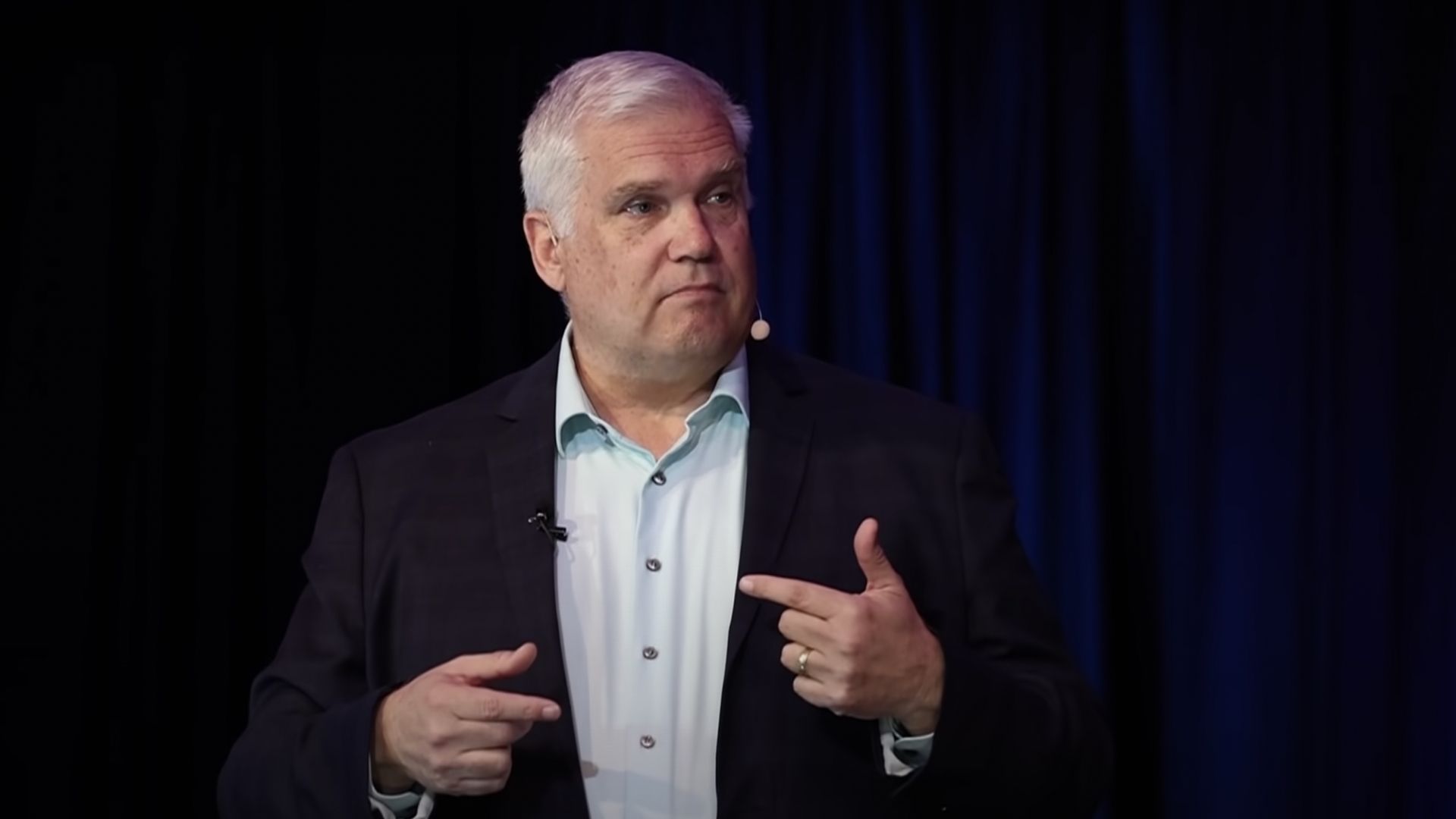
TED is supported by ads and partners 00:00
Why money can't buy happiness
Money Can T Buy Happiness
This essay will explore the adage “Money can’t buy happiness.” It will discuss the relationship between wealth and well-being, examining how and why increased income does not necessarily lead to increased happiness, and the factors that contribute to genuine contentment and fulfillment. On PapersOwl, there’s also a selection of free essay templates associated with Happiness.
How it works
Since happiness is a unique experience, the factors that promote happiness can of course be different for everyone. However, scientific research in the last 20 years has come a long way to identify many common factors that contribute to our happiness. Money (or income) is one of them. When we encounter the questions if feeling happy is related with money or not, some will use their opt in favour of money. However, the others, including me, claim money has a tiny role and comes not in the leading positions when compared with other effects.
In its simplest form, we can say: Yes, money is affecting our happiness. However, after this sentence, I can add a sentence that starts with “but’’.
What dimension of happiness is affected by money? There are many answers to this question. Because different theories and different disciplines (such as psychology, economy) can define in different ways. However, there is a general definition that is now accepted in the field of psychology. In fact, if we look at the dimensions of happiness rather than definition, we can better understand this concept.
Happiness is a concept with both emotional and cognitive dimensions. Emotionally feeling good means experiencing positive emotions frequently rather than experiencing negative emotions less often. Some experts define this as emotional balance. In the cognitive sense, happiness reflects the person’s perception of his / her life as satisfying. Many studies show that emotional and cognitive aspects of happiness can be affected by different factors. Money is one of these factors. For example, the monthly income of a person is important for life satisfaction and does not show a meaningful relationship with the emotional dimension of happiness. So as our income increases, we are beginning to perceive our lives as more satisfying. However, increasing income does not affect our daily emotional state much. Therefore, it may be important to know in what sense our income makes us happy.
If the quantity of money increases, does your level of happiness also increase? The answer to this question can be summarized as follows: While more money does not bring happiness, little money can make you feel emotionally worse. Therefore, making less money than a certain income level can reduce our quality of life. On the other hand, excess money after reaching a certain economic standard can increase our life satisfaction. The surplus money that comes after reaching a certain economic standard may not be emotionally happy. For example, in a study conducted by Kahneman and Deaton in 2010, it was seen that the winners of more than US $ 75,000 a year in the US compared to the winners of 75,000 US Dollars and the winners above this figure were not happier, or rather, their daily emotional states did not change.
In fact, the main point here is that if our earnings are enough to capture the living standards of our own, then this encourages us to feel good. However, gaining more than this income does not give us any extra happiness. In other words, I would not be very happy if I made so much money, it might not be meaningful to make guesses. Connecting our happiness to money may leave us completely powerless. Because when we get it and catch it, we feel happy but then we start searching for more.
Why is earning a lot of money problem for happiness? After a certain level of income (I said this is an average of $ 75,000 a year for America), there are a few reasons why money doesn’t make us happy in the emotional sense after a certain amount of money. One of these is that when people earn more money, people start to feel less gratitude for small things. There are also researches that support the fact that people can not really be happy with some tiny things as they earn more money. Another reason is that as income increases, people stop doing activities that will make them feel good in everyday life. For example, people with high incomes spend more time on working, shopping, child care or other obligatory jobs than being interested in socializing or hobbies or leisure activities that make them feel good. This can restrict their happiness.
How would spending money make us happy? Not having enough money is enough for a good life. The relationship between money and happiness is that a high income contributes to our happiness only when we spend it for those who need it or to buy gifts for our loved ones. For example, in a series of research by Professor Dunn and his friends, it shows that when university students spend about $ 10 or $ 20 of money to buy something for someone else, they feel better than spending time for themselves. Other studies show that they feel better when they use a certain amount of money given to them to experience experiences such as traveling or a little trip. His research in many rich and poor countries also shows that person is happier when almost everyone pays his / her money to a charity. Briefly, research tells us how our use of money is effective in our happiness.
Well, why do we choose to spend money for an article if it makes us happier to spend money for an experience or for someone else? One of the reasons for this is that our experiences are temporary and we think that what we buy is more permanent. For example, instead of spending money to go on a concert or a trip, we can choose to buy a new television which we think will be more permanent. So again, we can make mistakes when guessing what makes us happy.
Of course the outcome is not to spend our money for others and not to spend money. It is important for our happiness and life satisfaction to meet our own needs. It may not make sense to give our money to others in debt. I’ll talk about the details of the debt in the future.
Does it really make you happy to have something new? As I said, we’re pretty bad at predicting what makes us happy. We think we will be very happy when we have a new phone. So when our happiness increases with a new event, situation or something that we just have, we get used to the good feelings that we have experienced, and after a while we return to our old happiness level. Therefore, a new dress we bought brings a short time of happiness, and after a few days or even a few hours, we realize that we are not so happy or that our happiness lasts shorter than we expected.
Experiences are not like that. When we have a trip, a concert or a cinema experience, these experiences can help us to meet our psychological needs and make us feel better for longer. Because experiences are usually things we share with others, which brings us closer to others. We know that this kind of interpersonal relations has an important place in our happiness. Meeting the need for bonding with others is an experience that makes us feel good. This does not mean that the things we buy will not make us happy or give up on doing so. In fact, it is important to know that we are going to make a mistake when we guess what makes us happy. Moreover, we must be aware that our happiness may not be so long when we have something we desire, and that we may be disappointed that we are not happy again after we have reached the things we have been connected.
Does saving money make you happy? Our debts have a negative impact on our happiness. On the other hand, having an accumulation to keep us safe in the economic sense can contribute to our happiness. In fact, the debt causes conflicts in marriage and therefore negatively affects the happiness of couples. The negativity of being indebted has a stronger impact than the happiness of our experience. In other words, it may not make us happy to take a trip in debt and borrow again; The stress of debt can be more effective than the beauty of our experiences.
How accurate is it to compare ourselves with others? Another important factor in the relationship between money and happiness is relative income. Many people prefer to compare their earnings with the earnings of those around them (usually their peers). This situation, which is frequently seen especially among white-collar people, is not very useful. Research shows that the happiness of the group or the person we are comparing decreases as our income increases. But this is not always valid for everyone. For example, when comparing income in the early part of working life has a positive effect, a similar comparison in later times may adversely affect happiness. People’s income comparison with others at a young age and in their careers may be positive in terms of predicting their future earnings and increasing their motivation. However, the comparison of income after coming to a certain position may adversely affect happiness as it may lead to negative thoughts about the future.
On the other hand, according to the results of our research, it is better to see that our income is much more than one of our level (or our peers in general), especially in terms of career. However, social comparisons often rebound and leave a negative impact. Therefore, I cannot say that economic comparisons are very healthy.
Furthermore, your income from the past, your income today and the income you expect in the future can be quite important when looking at the relationship between money and happiness. Now it’s better to win more than we did in the past. I already mentioned above how the comparison affects happiness. If we are going to make us happy, we will be able to accept this idea even if we know that we won’t earn 8 billion a month. So even if it is not rational, we can hold onto a thought that makes us happy. For example, it is quite useful to appreciate what we have in economic terms and to remind them often. A materialist lifestyle may have negative consequences for psychological health. For example, when we look at America, people have more things (more cars or electronic goods per capita) compared to 50 years ago, but are they happier in the last 50 years? No. There is even the fact that they owe more. Especially nowadays it is quite natural to have more things to shop, to have more things and to take part in consumer culture. People may need it. However, it can affect our quality of life and relations badly. The life satisfaction of the people who make the habit of looking for riches decreases and they are less happy during the day.
In short, I can say that constantly thinking of making more money and looking for wealth, wishing to have more make us unhappy. Money is always a need but only enough to lead a good life. However, some people have different thoughts on this subject and these thoughts are actually confusing. For example, some say that expecting an increase in our financial situation has a positive impact on both general life satisfaction and economic satisfaction. So in the future – compared to today – we expect to be in a good economic situation, in other words, it is good to think optimistically about it. The financial situation that individuals think that they will have in the present and in the future contributes to their happiness. Another thing is that if there is an unexpected positive change in our income, our life satisfaction increases but in case of an unexpected negative change in our income, our life satisfaction is adversely affected. In other words, if we make an expectation error about our future financial expectations, this affects our life satisfaction badly.
What about comparing wealthy and prosperous countries with poor ones? I think that welfare countries are happier. Developed countries like Denmark, Finland, Norway and Canada are the happiest countries. Poor African countries appear to be at the end of the list. However, it should be kept in mind that the average levels of happiness in the country are taken into account. So there are unhappy people in rich countries, happy people in poor countries. In addition, while thinking about this issue in the framework of the above, it would be appropriate to make an evaluation. If we look at countries, the average income level is important for happiness and life satisfaction. But income, or money, is not enough to explain the difference in happiness between countries. In addition to income, factors such as democracy, social rights, human rights, security and trust are important factors in the level of general happiness of the countries.
As a consequence, the relationship between money and happiness is not that simple. Yes, money makes a sense of happiness, but there are many factors that prevent or allow it. Therefore, it is not quite right to make a comment without taking into account the circumstances and conditions. I believe that we can encourage our happiness for what we have. Because we know that we adapt to almost every situation. When we get a success, we are happy when we buy an item we want; but after a while we get used to it and we can return to our old level of happiness again. But it is also possible to slow down this harmony, or to be more realistic.
Work cites:
- https://wws.princeton.edu/sites/default/files/content/docs/news/Happiness_Money_Summary.pdf
- https://news.harvard.edu/gazette/story/2008/04/money-spent-on-others-can-buy-happiness/
- https://www.nytimes.com/2006/02/08/health/materialism-is-badfor-you-studies-say.html
Cite this page
Money Can t Buy Happiness. (2021, Jan 15). Retrieved from https://papersowl.com/examples/money-can-t-buy-happiness/
"Money Can t Buy Happiness." PapersOwl.com , 15 Jan 2021, https://papersowl.com/examples/money-can-t-buy-happiness/
PapersOwl.com. (2021). Money Can t Buy Happiness . [Online]. Available at: https://papersowl.com/examples/money-can-t-buy-happiness/ [Accessed: 30 May. 2024]
"Money Can t Buy Happiness." PapersOwl.com, Jan 15, 2021. Accessed May 30, 2024. https://papersowl.com/examples/money-can-t-buy-happiness/
"Money Can t Buy Happiness," PapersOwl.com , 15-Jan-2021. [Online]. Available: https://papersowl.com/examples/money-can-t-buy-happiness/. [Accessed: 30-May-2024]
PapersOwl.com. (2021). Money Can t Buy Happiness . [Online]. Available at: https://papersowl.com/examples/money-can-t-buy-happiness/ [Accessed: 30-May-2024]
Don't let plagiarism ruin your grade
Hire a writer to get a unique paper crafted to your needs.

Our writers will help you fix any mistakes and get an A+!
Please check your inbox.
You can order an original essay written according to your instructions.
Trusted by over 1 million students worldwide
1. Tell Us Your Requirements
2. Pick your perfect writer
3. Get Your Paper and Pay
Hi! I'm Amy, your personal assistant!
Don't know where to start? Give me your paper requirements and I connect you to an academic expert.
short deadlines
100% Plagiarism-Free
Certified writers
Does Money Buy Happiness? Essay
Whether or not money can buy happiness is a continued debate. Billions of people in all parts of the world sacrifice their ambitions and subconscious tensions on the altar of profitability and higher incomes. Millions of people dream to achieve the level of wellbeing, when earning money will no longer be a problem to them. Legal or illegal does not really matter, as long as these strategies lead individuals to the desired monetary outcomes.
Professional economists assert that more money does not buy happiness. As a result, it makes no sense for people to pursue money. Yet, the reality is quite different, as money, wealth, high incomes, and wide opportunities which they open make people extremely satisfied. Based on the current knowledge of economics, the opportunity costs of pursuing money can be extremely high. Therefore, it is better to pursue money for a purpose rather than for its own sake.
People always wanted more money. Money inspired professional economists and bank robbers. Millions of people would even try to sell their souls for a reasonable sum of money. Nevertheless, the debate on whether or not money can buy happiness continues to persist. Globalization and consumerism have turned money into the main criterion of individual and professional success: the more money you earn the better person you are.
However, professional economists suggest that money does not make people happy. The current state of research claims that, despite the rapid increase in personal incomes, the percentage of people who consider themselves happy has not changed (Lee, 2005). Similar disconnects between income and happiness were found in most advanced economies, including Japan, Europe, and the United Kingdom (Lee, 2005).
However, the general inconsistency of these research results is too obvious to ignore. First, what does it mean for people to be happy? Professional economists may have profound knowledge of economic concepts but can hardly make happiness measurable. Second, can people be happy with their incomes if they always want more? Most probably, at any given point, individuals will feel dissatisfied with what they have and will try to obtain more.
I agree that money buys happiness, but this happiness is never constant. This idea is further supported by Lee (2005), who assumes that people will make all sorts of sacrifices to get money, but their happiness will be temporary at best. Lee (2005) relies on the two main premises.
First, “happiness people realize from having more income results from having more relative to others in some reference group, not from having more absolutely” (p.389). Simply stated, individuals always compare their incomes and positions to those of other individuals. They want to have more relative to what others have or can have. However, their happiness wanes as soon as others achieve a better social position, income, or level of wellbeing.
Second, the nature of sensory adaptation in humans explains why people are never happy with what they have: human receptors become irresponsive to the continuous presence of one and the same stimulus (Lee, 2005). As a result, the more money individuals earn the happier they become; however, with time, money turns into boredom and no longer brings happiness.
Obviously, it does make sense to make money, since money is the main instrument of exchange and the source of unlimited opportunities for everyone. Money opens the gateway to a broad range of material and nonmaterial values, including health and education.
We should never belittle the significance of money merely because it brings only temporary satisfaction (Lee, 2005). Yet, it is always better to pursue money for a purpose rather than for its own sake. Money for the sake of money makes little sense. Money is not the end but only the means of achieving some goal, like purchasing a new house or curing a sick child.
Moreover, a common increase in individual wealth is always a positive externality, as richer countries experience lower childbirth mortality, fewer traffic deaths, better health, and longer life expectancy (Lee, 2005). We live in society and our wealth necessarily benefits others, through taxes and charity. Therefore, it always makes sense to pursue money to improve individual and societal wellbeing.
The opportunity costs of pursuing more money can be extremely high. Opportunity costs are everywhere, as every decision necessarily involves tradeoffs. Individuals sacrifice their families and personal wellbeing to become successful, rich professionals. Others apply to illegal activities and decisions to earn their wealth. In my own life, my decision to become educated was associated with major opportunity costs. First, the costs of education impose a heavy burden of financial obligations on me.
I could use this money to meet other life goals. Second, I spend more time at work and earn more money; I lose considerable earnings each time I pursue a better grade. Third, not all courses are equally pleasant: some courses seem not to be tailored to the specific needs and demands of the student majority (Frank, 2005). I could use this time to improve my knowledge of the disciplines that are important for my future career. To a large extent, the dollar cost of education does not reflect all opportunity costs.
Yet, many students forget that higher education provides a variety of benefits that helps to decrease most, if not, opportunity costs. Statistically, college and university graduates earn $14,000 a year more compared with their non-educated counterparts (Anonymous, 2003). The social value of higher education is difficult to underestimate (Porter, 2002). Education enhances workplace productivity and stimulates professional growth. Therefore, the marginal utility of a university degree increases.
Almost all economists treat opportunity cost as the main economic concept (Frank, 2005). Every single decision is inevitably associated with one or more opportunity costs. These involve explicit and implicit costs of other opportunities (Arnold, 2008; Baumol & Blinder, 2008). Opportunity costs reflect the significance of the cost-benefit principle that governs most individual decisions (Frank, 2005). Introductory economics courses must place particular emphasis on teaching students how to weigh benefits and costs of various decisions (Frank, 2005). This knowledge of economics and economic principles will subsequently reduce the opportunity costs of education.
Whether or not money can buy happiness is a continued debate. Billions of people in all parts of the world sacrifice their ambitions and subconscious tensions on the altar of profitability and higher incomes. The current state of research claims that, despite the rapid increase in personal incomes, the percentage of people who consider themselves happy has not changed.
However, these results do not reflect the real order of things in the world. Money buys happiness, but this happiness is never constant. The more money individuals earn the happier they become; however, with time, money turns into boredom and no longer brings happiness.
Moreover, a common increase in individual wealth is always a positive externality, as richer countries experience lower childbirth mortality, fewer traffic deaths, better health, and longer life expectancy. Yet, the opportunity costs of pursuing more money can be extremely high. Every single decision is inevitably associated with one or more opportunity costs. Knowledge of economics and economic principles will subsequently reduce the opportunity costs of education.
Anonymous. (2003). Report puts dollar value on education. Georgia College & State University. Web.
Arnold, R.A. (2008). Microeconomics. Boston: Cengage Learning.
Baumol, W.J. & Blinder, A.S. (2008). Microeconomics: Principles and policy. Boston: Cengage Learning.
Frank, R.H. (2005). The opportunity cost of economics education . The New York Times. Web.
Lee, D.R. (2005). Who says money cannot buy happiness? The Independent Review, X(3), 385-400.
Porter, K. (2002). The value of a college degree. ERIC Digest. Web.
- Can Money Buy You Happiness?
- David Leonhardt: May Be Money Does Buy Happiness After All
- Money Makes You Happy: Philosophical Reasoning
- Two Industries in Different Market Structures
- Supply and Demand: The Case of Milk
- Microeconomics Module – Supply and Demand
- Microeconomics Demand: Utility and Marginality
- Opportunity Cost
- Chicago (A-D)
- Chicago (N-B)
IvyPanda. (2018, October 12). Does Money Buy Happiness? https://ivypanda.com/essays/does-money-buy-happiness/
"Does Money Buy Happiness?" IvyPanda , 12 Oct. 2018, ivypanda.com/essays/does-money-buy-happiness/.
IvyPanda . (2018) 'Does Money Buy Happiness'. 12 October.
IvyPanda . 2018. "Does Money Buy Happiness?" October 12, 2018. https://ivypanda.com/essays/does-money-buy-happiness/.
1. IvyPanda . "Does Money Buy Happiness?" October 12, 2018. https://ivypanda.com/essays/does-money-buy-happiness/.
Bibliography
IvyPanda . "Does Money Buy Happiness?" October 12, 2018. https://ivypanda.com/essays/does-money-buy-happiness/.

Why Money Doesn't Buy Happiness
According to kahneman and deaton, money doesn't buy happiness. why not.
Posted August 25, 2022 | Reviewed by Michelle Quirk
- It's often said that money doesn't buy happiness, and, in a 2010 study, Kahneman and Deaton show that it doesn't.
- Nevertheless, most people apparently think that it does.
- Kahneman and Deaton found that "emotional well-being" is associated with social interaction rather than with higher income.
The old saw “money can’t buy happiness ” is often used, mostly by people who don’t have much, as a challenge to the importance of wealth in human society. But is it true? Does more money really not make people happier?
In a 2010 study, Nobel laureate Daniel Kahneman and Angus Deaton set out to answer this question. They explored two aspects of what’s known as “subjective well-being.” Importantly, they made a distinction between emotional well-being and life evaluation. Emotional well-being is defined as “…the emotional quality of an individual’s everyday experience—the frequency and intensity of experiences of joy, fascination, anxiety , sadness, anger , affection that make one’s life pleasant or unpleasant." Life evaluation “refers to a person’s thoughts about his or her life.” Here is what they found:
In the present study, we confirm the contribution of higher income to improving individuals’ life evaluation, even among those who are already well off. However, we also find that the effects of income on the emotional dimension of well-being satiate fully at an annual income of ∼$75,000… (Kahneman and Deaton, 2010, p. 16490).
In other words, getting more money makes us think our lives are better, but doesn’t make us feel any better.
To be sure, not having enough money negatively affects our emotional well-being. But once we have enough (about $75,000 in 2010), having more doesn’t positively affect it. So, while we think our lives would be better if we got a raise or hit the lottery jackpot, we’d be no happier than we were before the windfall. Now that’s interesting. Money really doesn’t buy happiness.
But why not? We think that Kahneman and Deaton’s distinction between life evaluation and emotional well-being might provide an answer.

Evolution of Emotional Well-Being
The emotions of well-being the authors identify—joy, fascination, anxiety, sadness, anger, affection—evolved over hundreds of thousands of years in hunter–gatherer bands. There was no money in these bands, of course, and, as we’ve noted in previous blogs, it was more important to use possessions as gifts than hold on to them. Well-being was having enough to eat and interacting with the other members of the band—hunting, gathering, quarreling, fighting, telling stories, dancing, healing.
However, since the agricultural revolution, human history has been in large part the story of acquisition—more land, money, possessions, power. Today, acquisition messages are all around us: Buy more and better things, get a higher-paying job. These messages address post-agricultural thinking but ignore ancient emotional needs.
Thinking about how your life is going or will go is another creation of our old friend and nemesis the neocortex. Given the obvious advantages of wealth and power after the agricultural revolution, the cortex turned them into ideas, things to aspire to, goals . Moving up was good, whether it made you happy or not.
As more and more opportunities to move up were created by the industrial revolution and the market economy, more and more people could rise. It was great to have enough—enough money, enough to eat, and a place to live. And it felt good to rise and have more status.
A Moving Goal
Unfortunately, there was an unintended consequence: The goal kept moving. There was always a better position, a better salary, higher status. Thinking about well-being became associated with making more money. When Donald Trump was asked about what money meant to him, he said “Money was never a big motivation for me, except as a way to keep score.” He didn’t mention happiness.
So, here we humans are, stuck again between ancient emotions and an environment that pushes us to achieve and acquire. As Kahneman and Deaton note in their study, when asked the question, “What made you happy yesterday,” most people emphasized time with family and friends, taking care of a relative, working on a project with others, etc. When asked what they thought would make them happier, most said, “Having more money.”
Kahneman, D. and Deaton, A. 2010. “High Income Improves Evaluation of Life, But Not Emotional Well-Being.” PNAS. September 21, 2010, vol. 107, no. 38, pp. 16489-16493.

J. Gary Bernhard, Ed.D. has been involved in educational leadership for more than 40 years. Kalman Glantz, Ph.D. has spent nearly 30 years as a psychotherapist in private practice in Boston.
- Find a Therapist
- Find a Treatment Center
- Find a Psychiatrist
- Find a Support Group
- Find Online Therapy
- United States
- Brooklyn, NY
- Chicago, IL
- Houston, TX
- Los Angeles, CA
- New York, NY
- Portland, OR
- San Diego, CA
- San Francisco, CA
- Seattle, WA
- Washington, DC
- Asperger's
- Bipolar Disorder
- Chronic Pain
- Eating Disorders
- Passive Aggression
- Personality
- Goal Setting
- Positive Psychology
- Stopping Smoking
- Low Sexual Desire
- Relationships
- Child Development
- Self Tests NEW
- Therapy Center
- Diagnosis Dictionary
- Types of Therapy

At any moment, someone’s aggravating behavior or our own bad luck can set us off on an emotional spiral that threatens to derail our entire day. Here’s how we can face our triggers with less reactivity so that we can get on with our lives.
- Emotional Intelligence
- Gaslighting
- Affective Forecasting
- Neuroscience
More Proof That Money Can Buy Happiness (or a Life with Less Stress)
When we wonder whether money can buy happiness, we may consider the luxuries it provides, like expensive dinners and lavish vacations. But cash is key in another important way: It helps people avoid many of the day-to-day hassles that cause stress, new research shows.
Money can provide calm and control, allowing us to buy our way out of unforeseen bumps in the road, whether it’s a small nuisance, like dodging a rainstorm by ordering up an Uber, or a bigger worry, like handling an unexpected hospital bill, says Harvard Business School professor Jon Jachimowicz.
“If we only focus on the happiness that money can bring, I think we are missing something,” says Jachimowicz, an assistant professor of business administration in the Organizational Behavior Unit at HBS. “We also need to think about all of the worries that it can free us from.”
The idea that money can reduce stress in everyday life and make people happier impacts not only the poor, but also more affluent Americans living at the edge of their means in a bumpy economy. Indeed, in 2019, one in every four Americans faced financial scarcity, according to the Board of Governors of the Federal Reserve System. The findings are particularly important now, as inflation eats into the ability of many Americans to afford basic necessities like food and gas, and COVID-19 continues to disrupt the job market.
Buying less stress
The inspiration for researching how money alleviates hardships came from advice that Jachimowicz’s father gave him. After years of living as a struggling graduate student, Jachimowicz received his appointment at HBS and the financial stability that came with it.
“My father said to me, ‘You are going to have to learn how to spend money to fix problems.’” The idea stuck with Jachimowicz, causing him to think differently about even the everyday misfortunes that we all face.
To test the relationship between cash and life satisfaction, Jachimowicz and his colleagues from the University of Southern California, Groningen University, and Columbia Business School conducted a series of experiments, which are outlined in a forthcoming paper in the journal Social Psychological and Personality Science , The Sharp Spikes of Poverty: Financial Scarcity Is Related to Higher Levels of Distress Intensity in Daily Life .
Higher income amounts to lower stress
In one study, 522 participants kept a diary for 30 days, tracking daily events and their emotional responses to them. Participants’ incomes in the previous year ranged from less than $10,000 to $150,000 or more. They found:
- Money reduces intense stress: There was no significant difference in how often the participants experienced distressing events—no matter their income, they recorded a similar number of daily frustrations. But those with higher incomes experienced less negative intensity from those events.
- More money brings greater control : Those with higher incomes felt they had more control over negative events and that control reduced their stress. People with ample incomes felt more agency to deal with whatever hassles may arise.
- Higher incomes lead to higher life satisfaction: People with higher incomes were generally more satisfied with their lives.
“It’s not that rich people don’t have problems,” Jachimowicz says, “but having money allows you to fix problems and resolve them more quickly.”
Why cash matters
In another study, researchers presented about 400 participants with daily dilemmas, like finding time to cook meals, getting around in an area with poor public transportation, or working from home among children in tight spaces. They then asked how participants would solve the problem, either using cash to resolve it, or asking friends and family for assistance. The results showed:
- People lean on family and friends regardless of income: Jachimowicz and his colleagues found that there was no difference in how often people suggested turning to friends and family for help—for example, by asking a friend for a ride or asking a family member to help with childcare or dinner.
- Cash is the answer for people with money: The higher a person’s income, however, the more likely they were to suggest money as a solution to a hassle, for example, by calling an Uber or ordering takeout.
While such results might be expected, Jachimowicz says, people may not consider the extent to which the daily hassles we all face create more stress for cash-strapped individuals—or the way a lack of cash may tax social relationships if people are always asking family and friends for help, rather than using their own money to solve a problem.
“The question is, when problems come your way, to what extent do you feel like you can deal with them, that you can walk through life and know everything is going to be OK,” Jachimowicz says.
Breaking the ‘shame spiral’
In another recent paper , Jachimowicz and colleagues found that people experiencing financial difficulties experience shame, which leads them to avoid dealing with their problems and often makes them worse. Such “shame spirals” stem from a perception that people are to blame for their own lack of money, rather than external environmental and societal factors, the research team says.
“We have normalized this idea that when you are poor, it’s your fault and so you should be ashamed of it,” Jachimowicz says. “At the same time, we’ve structured society in a way that makes it really hard on people who are poor.”
For example, Jachimowicz says, public transportation is often inaccessible and expensive, which affects people who can’t afford cars, and tardy policies at work often penalize people on the lowest end of the pay scale. Changing those deeply-engrained structures—and the way many of us think about financial difficulties—is crucial.
After all, society as a whole may feel the ripple effects of the financial hardships some people face, since financial strain is linked with lower job performance, problems with long-term decision-making, and difficulty with meaningful relationships, the research says. Ultimately, Jachimowicz hopes his work can prompt thinking about systemic change.
“People who are poor should feel like they have some control over their lives, too. Why is that a luxury we only afford to rich people?” Jachimowicz says. “We have to structure organizations and institutions to empower everyone.”
[Image: iStockphoto/mihtiander]
Related reading from the Working Knowledge Archives
Selling Out The American Dream
- 21 Oct 2022
- Research & Ideas
People Trust Business, But Expect CEOs to Drive Social Change
- 06 May 2024
The Critical Minutes After a Virtual Meeting That Can Build Up or Tear Down Teams
- 24 Jan 2024
Why Boeing’s Problems with the 737 MAX Began More Than 25 Years Ago
- 25 Feb 2019
How Gender Stereotypes Kill a Woman’s Self-Confidence
- 09 May 2024
Called Back to the Office? How You Benefit from Ideas You Didn't Know You Were Missing
- Social Psychology
Sign up for our weekly newsletter

- SUGGESTED TOPICS
- The Magazine
- Newsletters
- Managing Yourself
- Managing Teams
- Work-life Balance
- The Big Idea
- Data & Visuals
- Reading Lists
- Case Selections
- HBR Learning
- Topic Feeds
- Account Settings
- Email Preferences
Does More Money Really Make Us More Happy?
- Elizabeth Dunn
- Chris Courtney

A big paycheck won’t necessarily bring you joy
Although some studies show that wealthier people tend to be happier, prioritizing money over time can actually have the opposite effect.
- But even having just a little bit of extra cash in your savings account ($500), can increase your life satisfaction. So how can you keep more cash on hand?
- Ask yourself: What do I buy that isn’t essential for my survival? Is the expense genuinely contributing to my happiness? If the answer to the second question is no, try taking a break from those expenses.
- Other research shows there are specific ways to spend your money to promote happiness, such as spending on experiences, buying time, and investing in others.
- Spending choices that promote happiness are also dependent on individual personalities, and future research may provide more individualized advice to help you get the most happiness from your money.
Where your work meets your life. See more from Ascend here .
How often have you willingly sacrificed your free time to make more money? You’re not alone. But new research suggests that prioritizing money over time may actually undermine our happiness.
- ED Elizabeth Dunn is a professor of psychology at the University of British Columbia and Chief Science Officer of Happy Money, a financial technology company with a mission to help borrowers become savers. She is also co-author of “ Happy Money: The Science of Happier Spending ” with Dr. Michael Norton. Her TED2019 talk on money and happiness was selected as one of the top 10 talks of the year by TED.
- CC Chris Courtney is the VP of Science at Happy Money. He utilizes his background in cognitive neuroscience, human-computer interaction, and machine learning to drive personalization and engagement in products designed to empower people to take control of their financial lives. His team is focused on creating innovative ways to provide more inclusionary financial services, while building tools to promote financial and psychological well-being and success.
Partner Center

Essay on Can Money Buy Happiness
Students are often asked to write an essay on Can Money Buy Happiness in their schools and colleges. And if you’re also looking for the same, we have created 100-word, 250-word, and 500-word essays on the topic.
Let’s take a look…
100 Words Essay on Can Money Buy Happiness
Introduction.
Money is essential in life, but can it buy happiness? This question has sparked debates worldwide.
Money and Materialistic Joy
Money can buy materialistic things that bring joy. For example, your favorite video game or a bicycle can make you happy, and you need money for them.
Money and Freedom
Money can provide freedom to explore hobbies, travel, and experience new things, which can lead to happiness.
Limitations of Money
However, money can’t buy love, friendship, health, or peace of mind, which are essential for true happiness.
In conclusion, while money can buy temporary joy, it can’t buy lasting happiness.
250 Words Essay on Can Money Buy Happiness
The age-old question, “Can money buy happiness?” has sparked countless debates among philosophers, economists, and psychologists. While some argue that wealth is a key contributor to happiness, others believe that happiness lies in intangible aspects of life.
The Power of Wealth
Money, undeniably, holds power. It provides the ability to afford basic necessities, luxuries, and experiences. It can help in eliminating stressors like debt and financial instability, which are often associated with unhappiness. From a utilitarian perspective, money can indeed buy happiness as it facilitates access to goods and services that can improve quality of life.
The Limitations of Money
However, the relationship between money and happiness is not linear. Beyond a certain income level, additional wealth does not equate to increased happiness. This is known as the ‘Easterlin Paradox’. Also, an overemphasis on wealth can lead to materialism, which has been linked to decreased well-being and increased mental health issues.
The Role of Intangible Aspects
While money can provide comfort and security, it cannot buy intangible aspects such as love, friendship, health, or peace of mind. These aspects, according to many psychologists, are the true essence of happiness. They provide a sense of belonging, purpose, and contentment that money cannot procure.
In conclusion, money can buy temporary happiness by providing comfort, security, and experiences. However, it falls short in procuring lasting happiness that is often found in intangible aspects of life. Thus, the pursuit of wealth should be balanced with the pursuit of intangible aspects to achieve holistic happiness.
500 Words Essay on Can Money Buy Happiness
The question, “Can money buy happiness?” is a popular one. Many people think that having more money means being happier. But is that really true? Let’s explore this idea in a simple way.
Money and Basic Needs
Firstly, money is important because it helps us meet our basic needs. It allows us to buy food, clothes, and a place to live. Without money, we would struggle to survive. In this way, money can bring a certain level of happiness. It provides comfort and security, which are key to feeling satisfied in life.
Money and Material Possessions
Secondly, money can buy material things. This includes toys, gadgets, cars, or even vacations. These things can make us feel happy for a while. But after some time, the excitement fades. We start to want newer, better things. This is called the “hedonic treadmill.” It means that buying stuff only brings short-term happiness. Over time, we get used to what we have and want more.
Money and Relationships
Thirdly, let’s consider money and relationships. Money can help us do nice things for others. We can buy gifts for friends or donate to those in need. This can make us feel good about ourselves. But, money can’t buy true friendship or love. These are based on trust, understanding, and shared experiences. They can’t be bought with money.
Money and Happiness: The Real Picture
So, can money buy happiness? The answer is not straightforward. Money can buy things that make life more comfortable and enjoyable. But it can’t buy everything. It can’t buy love, good health, time, or peace of mind. These things are often the most important for true happiness.
Research shows that after a certain income level, more money doesn’t equal more happiness. This level is enough to meet basic needs and some wants. Beyond that, more money might not make a big difference in how happy you are.
In conclusion, money can buy some forms of happiness, but not all. It’s important to remember that the best things in life aren’t things. They are experiences, relationships, and good health. These can’t be bought with money. So, while money is important, it’s not the only path to happiness. It’s just one piece of the puzzle.
Remember, happiness comes from within. It’s about being content with what you have, not what you don’t have. It’s about enjoying the simple things in life. And most importantly, it’s about being true to yourself and your values.
That’s it! I hope the essay helped you.
If you’re looking for more, here are essays on other interesting topics:
- Essay on Can Computers Replace Teacher
- Essay on Can Anyone be Above the Law
- Essay on Bullying
Apart from these, you can look at all the essays by clicking here .
Happy studying!
Leave a Reply Cancel reply
Your email address will not be published. Required fields are marked *
Save my name, email, and website in this browser for the next time I comment.

Home / Essay Samples / Life / Money / Can Money Buy Happiness? An Argumentative Analysis
Can Money Buy Happiness? An Argumentative Analysis
- Category: Life , Education
- Topic: Happiness , Money , Personal Statement
Pages: 1 (436 words)
- Downloads: -->
--> ⚠️ Remember: This essay was written and uploaded by an--> click here.
Found a great essay sample but want a unique one?
are ready to help you with your essay
You won’t be charged yet!
Studying Abroad Essays
Academic Interests Essays
Brittany Stinson Essays
Indian Education Essays
Graduation Essays
Related Essays
We are glad that you like it, but you cannot copy from our website. Just insert your email and this sample will be sent to you.
By clicking “Send”, you agree to our Terms of service and Privacy statement . We will occasionally send you account related emails.
Your essay sample has been sent.
In fact, there is a way to get an original essay! Turn to our writers and order a plagiarism-free paper.
samplius.com uses cookies to offer you the best service possible.By continuing we’ll assume you board with our cookie policy .--> -->